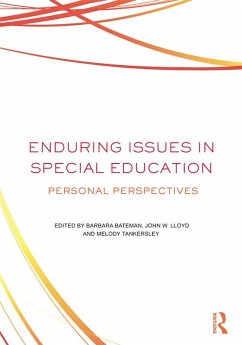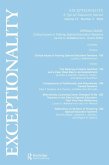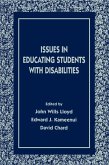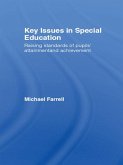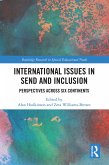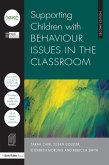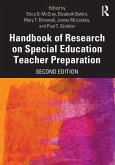Enduring Issues In Special Education (eBook, PDF)
Personal Perspectives
Redaktion: Bateman, Barbara; Tankersley, Melody; Lloyd, John W.
63,95 €
63,95 €
inkl. MwSt.
Sofort per Download lieferbar

32 °P sammeln
63,95 €
Als Download kaufen

63,95 €
inkl. MwSt.
Sofort per Download lieferbar

32 °P sammeln
Jetzt verschenken
Alle Infos zum eBook verschenken
63,95 €
inkl. MwSt.
Sofort per Download lieferbar
Alle Infos zum eBook verschenken

32 °P sammeln
Enduring Issues In Special Education (eBook, PDF)
Personal Perspectives
Redaktion: Bateman, Barbara; Tankersley, Melody; Lloyd, John W.
- Format: PDF
- Merkliste
- Auf die Merkliste
- Bewerten Bewerten
- Teilen
- Produkt teilen
- Produkterinnerung
- Produkterinnerung

Bitte loggen Sie sich zunächst in Ihr Kundenkonto ein oder registrieren Sie sich bei
bücher.de, um das eBook-Abo tolino select nutzen zu können.
Hier können Sie sich einloggen
Hier können Sie sich einloggen
Sie sind bereits eingeloggt. Klicken Sie auf 2. tolino select Abo, um fortzufahren.

Bitte loggen Sie sich zunächst in Ihr Kundenkonto ein oder registrieren Sie sich bei bücher.de, um das eBook-Abo tolino select nutzen zu können.
Enduring Issues in Special Education is aimed at any course in the undergraduate or graduate special education curriculum that is wholly or partly devoted to a critical examination of current issues in special education.
- Geräte: PC
- mit Kopierschutz
- eBook Hilfe
- Größe: 3.23MB
Andere Kunden interessierten sich auch für
![Critical Issues in Training Special Education Teachers (eBook, PDF) Critical Issues in Training Special Education Teachers (eBook, PDF)]() Critical Issues in Training Special Education Teachers (eBook, PDF)27,95 €
Critical Issues in Training Special Education Teachers (eBook, PDF)27,95 €![Issues in Educating Students With Disabilities (eBook, PDF) Issues in Educating Students With Disabilities (eBook, PDF)]() Issues in Educating Students With Disabilities (eBook, PDF)62,95 €
Issues in Educating Students With Disabilities (eBook, PDF)62,95 €![Key Issues In Special Education (eBook, PDF) Key Issues In Special Education (eBook, PDF)]() Michael FarrellKey Issues In Special Education (eBook, PDF)44,95 €
Michael FarrellKey Issues In Special Education (eBook, PDF)44,95 €![International Issues in SEND and Inclusion (eBook, PDF) International Issues in SEND and Inclusion (eBook, PDF)]() International Issues in SEND and Inclusion (eBook, PDF)42,95 €
International Issues in SEND and Inclusion (eBook, PDF)42,95 €![Who Benefits From Special Education? (eBook, PDF) Who Benefits From Special Education? (eBook, PDF)]() Who Benefits From Special Education? (eBook, PDF)44,95 €
Who Benefits From Special Education? (eBook, PDF)44,95 €![Supporting Children with Behaviour Issues in the Classroom (eBook, PDF) Supporting Children with Behaviour Issues in the Classroom (eBook, PDF)]() Hull City CouncilSupporting Children with Behaviour Issues in the Classroom (eBook, PDF)26,95 €
Hull City CouncilSupporting Children with Behaviour Issues in the Classroom (eBook, PDF)26,95 €![Handbook of Research on Special Education Teacher Preparation (eBook, PDF) Handbook of Research on Special Education Teacher Preparation (eBook, PDF)]() Handbook of Research on Special Education Teacher Preparation (eBook, PDF)131,95 €
Handbook of Research on Special Education Teacher Preparation (eBook, PDF)131,95 €-
-
-
Enduring Issues in Special Education is aimed at any course in the undergraduate or graduate special education curriculum that is wholly or partly devoted to a critical examination of current issues in special education.
Dieser Download kann aus rechtlichen Gründen nur mit Rechnungsadresse in A, B, BG, CY, CZ, D, DK, EW, E, FIN, F, GR, HR, H, IRL, I, LT, L, LR, M, NL, PL, P, R, S, SLO, SK ausgeliefert werden.
Produktdetails
- Produktdetails
- Verlag: Taylor & Francis eBooks
- Seitenzahl: 496
- Erscheinungstermin: 20. Februar 2015
- Englisch
- ISBN-13: 9781136265976
- Artikelnr.: 42369402
- Verlag: Taylor & Francis eBooks
- Seitenzahl: 496
- Erscheinungstermin: 20. Februar 2015
- Englisch
- ISBN-13: 9781136265976
- Artikelnr.: 42369402
- Herstellerkennzeichnung Die Herstellerinformationen sind derzeit nicht verfügbar.
Barbara Bateman is a consultant in special education law and Professor Emerita at the University of Oregon. John W. Lloyd is Professor of Education and Coordinator for the Program in Special Education at the University of Virginia, Curry School of Education. Melody Tankersley is Professor of Special Education and Associate Provost for Academic Affairs at Kent State University.
Foreword
David Chard
Preface
Chapter 1: Introduction: Does Special Education Have Issues?
Tankersley, Lloyd, & Bateman
Section 1: What is Special Education?
Chapter 2: What is Special Education?
Bateman, Lloyd, Tankersley, & Brown
Chapter 3: What Makes Special Education Special?
T. Scruggs & M. Mastropieri
Chapter 4: What is Special Education Instruction?
P. C. Pullen & D. P. Hallahan
Chapter 5: What Should We Teach Students with Moderate and Severe
Developmental Disabilities?
D. Browder
Chapter 6: Special Education as "Specially Designed Instruction": Ode to
the Architecture of Information and the Message
Kame'enui
Section 2: Who Should Receive and Provide Special Education?
Chapter 7: Who Should Receive and Provide Special Education?
Bateman, Lloyd, Tankersley & Driver
Chapter 8: Cultural and Linguistic Diversity in Special Education
J. Klingner, B. Moore, A. Davidson, A. Boelé, A. Boardman, R. Figueroa , S.
Annamma, N. Sager
Chapter 9: Who Should Receive Special Education Services and How Should
Educators Identify Which Students are to Receive Special Education
Services?
E. Lembke
Chapter 10: Co-teaching: Not All Special Educators Should Dance
M. P. Weiss
Chapter 11: Who Makes a Difference! Next Generation Special Education
Workforce Renewal
M. Rock & B. Billingsley
Section 3: Where Should Special Education Happen?
Chapter 12: Where Should Special Education Take Place?
Bateman, Lloyd, Tankersley, & Alves
Chapter 13: Where Should Students with Disabilities Receive Their
Education?
N. Zigmond
Chapter 14: Placements for Special Education Students: The Promise and the
Peril
D. Huefner
Chapter 15: Place Values: What Moral Psychology Can Tell Us About the Full
Inclusion Debate in Special Education
A. Wiley
Section 4: How Should Special Education be Practiced?
Chapter 16: How is Special Education Practiced?
Lloyd, Tankersley, Bateman, & Hirsch
Chapter 17: How Should Evidence-based Practices be Determined?
B. Cook
Chapter 18: The Connection between Assessment and Intervention: How Can
Screening Lead to Better Interventions?
K. Lane & H. Walker
Chapter 19: How Should Learning Environments (Schools and Classrooms) be
Structured for Best Learner Outcomes?
C. Greenwood
Chapter 20: How Should We Evaluate Whether Special Education Works?
M. Thurlow
Section 5: When Should Special Education Begin and End?
Chapter 21: When Should Special Education Start and End?
Bateman, Lloyd, Tankersley, & Dillon
Chapter 22: Children Should be Identified and Receive Special Education
Services in Early Childhood
J. Carta
Chapter 23: When Does Special Education End?
M. Wehmeyer
Section 6: Why Do We Have Special Education?
Chapter 24: Why Should We Have Special Education?
Lloyd, Tankersley, & Bateman
Chapter 25: Why We Should Have Special Education
J. Kauffman
Chapter 26: How Should We Pay for Special Education?
T. Parrish
Chapter 27: Science Matters in Special Education
T. Landrum
Section 7: Whither Special Education?
Chapter 28: Whither Special Education?
Lloyd, Tankersley, Bateman, Balan, & Lloyd
Index
David Chard
Preface
Chapter 1: Introduction: Does Special Education Have Issues?
Tankersley, Lloyd, & Bateman
Section 1: What is Special Education?
Chapter 2: What is Special Education?
Bateman, Lloyd, Tankersley, & Brown
Chapter 3: What Makes Special Education Special?
T. Scruggs & M. Mastropieri
Chapter 4: What is Special Education Instruction?
P. C. Pullen & D. P. Hallahan
Chapter 5: What Should We Teach Students with Moderate and Severe
Developmental Disabilities?
D. Browder
Chapter 6: Special Education as "Specially Designed Instruction": Ode to
the Architecture of Information and the Message
Kame'enui
Section 2: Who Should Receive and Provide Special Education?
Chapter 7: Who Should Receive and Provide Special Education?
Bateman, Lloyd, Tankersley & Driver
Chapter 8: Cultural and Linguistic Diversity in Special Education
J. Klingner, B. Moore, A. Davidson, A. Boelé, A. Boardman, R. Figueroa , S.
Annamma, N. Sager
Chapter 9: Who Should Receive Special Education Services and How Should
Educators Identify Which Students are to Receive Special Education
Services?
E. Lembke
Chapter 10: Co-teaching: Not All Special Educators Should Dance
M. P. Weiss
Chapter 11: Who Makes a Difference! Next Generation Special Education
Workforce Renewal
M. Rock & B. Billingsley
Section 3: Where Should Special Education Happen?
Chapter 12: Where Should Special Education Take Place?
Bateman, Lloyd, Tankersley, & Alves
Chapter 13: Where Should Students with Disabilities Receive Their
Education?
N. Zigmond
Chapter 14: Placements for Special Education Students: The Promise and the
Peril
D. Huefner
Chapter 15: Place Values: What Moral Psychology Can Tell Us About the Full
Inclusion Debate in Special Education
A. Wiley
Section 4: How Should Special Education be Practiced?
Chapter 16: How is Special Education Practiced?
Lloyd, Tankersley, Bateman, & Hirsch
Chapter 17: How Should Evidence-based Practices be Determined?
B. Cook
Chapter 18: The Connection between Assessment and Intervention: How Can
Screening Lead to Better Interventions?
K. Lane & H. Walker
Chapter 19: How Should Learning Environments (Schools and Classrooms) be
Structured for Best Learner Outcomes?
C. Greenwood
Chapter 20: How Should We Evaluate Whether Special Education Works?
M. Thurlow
Section 5: When Should Special Education Begin and End?
Chapter 21: When Should Special Education Start and End?
Bateman, Lloyd, Tankersley, & Dillon
Chapter 22: Children Should be Identified and Receive Special Education
Services in Early Childhood
J. Carta
Chapter 23: When Does Special Education End?
M. Wehmeyer
Section 6: Why Do We Have Special Education?
Chapter 24: Why Should We Have Special Education?
Lloyd, Tankersley, & Bateman
Chapter 25: Why We Should Have Special Education
J. Kauffman
Chapter 26: How Should We Pay for Special Education?
T. Parrish
Chapter 27: Science Matters in Special Education
T. Landrum
Section 7: Whither Special Education?
Chapter 28: Whither Special Education?
Lloyd, Tankersley, Bateman, Balan, & Lloyd
Index
Foreword
David Chard
Preface
Chapter 1: Introduction: Does Special Education Have Issues?
Tankersley, Lloyd, & Bateman
Section 1: What is Special Education?
Chapter 2: What is Special Education?
Bateman, Lloyd, Tankersley, & Brown
Chapter 3: What Makes Special Education Special?
T. Scruggs & M. Mastropieri
Chapter 4: What is Special Education Instruction?
P. C. Pullen & D. P. Hallahan
Chapter 5: What Should We Teach Students with Moderate and Severe
Developmental Disabilities?
D. Browder
Chapter 6: Special Education as "Specially Designed Instruction": Ode to
the Architecture of Information and the Message
Kame'enui
Section 2: Who Should Receive and Provide Special Education?
Chapter 7: Who Should Receive and Provide Special Education?
Bateman, Lloyd, Tankersley & Driver
Chapter 8: Cultural and Linguistic Diversity in Special Education
J. Klingner, B. Moore, A. Davidson, A. Boelé, A. Boardman, R. Figueroa , S.
Annamma, N. Sager
Chapter 9: Who Should Receive Special Education Services and How Should
Educators Identify Which Students are to Receive Special Education
Services?
E. Lembke
Chapter 10: Co-teaching: Not All Special Educators Should Dance
M. P. Weiss
Chapter 11: Who Makes a Difference! Next Generation Special Education
Workforce Renewal
M. Rock & B. Billingsley
Section 3: Where Should Special Education Happen?
Chapter 12: Where Should Special Education Take Place?
Bateman, Lloyd, Tankersley, & Alves
Chapter 13: Where Should Students with Disabilities Receive Their
Education?
N. Zigmond
Chapter 14: Placements for Special Education Students: The Promise and the
Peril
D. Huefner
Chapter 15: Place Values: What Moral Psychology Can Tell Us About the Full
Inclusion Debate in Special Education
A. Wiley
Section 4: How Should Special Education be Practiced?
Chapter 16: How is Special Education Practiced?
Lloyd, Tankersley, Bateman, & Hirsch
Chapter 17: How Should Evidence-based Practices be Determined?
B. Cook
Chapter 18: The Connection between Assessment and Intervention: How Can
Screening Lead to Better Interventions?
K. Lane & H. Walker
Chapter 19: How Should Learning Environments (Schools and Classrooms) be
Structured for Best Learner Outcomes?
C. Greenwood
Chapter 20: How Should We Evaluate Whether Special Education Works?
M. Thurlow
Section 5: When Should Special Education Begin and End?
Chapter 21: When Should Special Education Start and End?
Bateman, Lloyd, Tankersley, & Dillon
Chapter 22: Children Should be Identified and Receive Special Education
Services in Early Childhood
J. Carta
Chapter 23: When Does Special Education End?
M. Wehmeyer
Section 6: Why Do We Have Special Education?
Chapter 24: Why Should We Have Special Education?
Lloyd, Tankersley, & Bateman
Chapter 25: Why We Should Have Special Education
J. Kauffman
Chapter 26: How Should We Pay for Special Education?
T. Parrish
Chapter 27: Science Matters in Special Education
T. Landrum
Section 7: Whither Special Education?
Chapter 28: Whither Special Education?
Lloyd, Tankersley, Bateman, Balan, & Lloyd
Index
David Chard
Preface
Chapter 1: Introduction: Does Special Education Have Issues?
Tankersley, Lloyd, & Bateman
Section 1: What is Special Education?
Chapter 2: What is Special Education?
Bateman, Lloyd, Tankersley, & Brown
Chapter 3: What Makes Special Education Special?
T. Scruggs & M. Mastropieri
Chapter 4: What is Special Education Instruction?
P. C. Pullen & D. P. Hallahan
Chapter 5: What Should We Teach Students with Moderate and Severe
Developmental Disabilities?
D. Browder
Chapter 6: Special Education as "Specially Designed Instruction": Ode to
the Architecture of Information and the Message
Kame'enui
Section 2: Who Should Receive and Provide Special Education?
Chapter 7: Who Should Receive and Provide Special Education?
Bateman, Lloyd, Tankersley & Driver
Chapter 8: Cultural and Linguistic Diversity in Special Education
J. Klingner, B. Moore, A. Davidson, A. Boelé, A. Boardman, R. Figueroa , S.
Annamma, N. Sager
Chapter 9: Who Should Receive Special Education Services and How Should
Educators Identify Which Students are to Receive Special Education
Services?
E. Lembke
Chapter 10: Co-teaching: Not All Special Educators Should Dance
M. P. Weiss
Chapter 11: Who Makes a Difference! Next Generation Special Education
Workforce Renewal
M. Rock & B. Billingsley
Section 3: Where Should Special Education Happen?
Chapter 12: Where Should Special Education Take Place?
Bateman, Lloyd, Tankersley, & Alves
Chapter 13: Where Should Students with Disabilities Receive Their
Education?
N. Zigmond
Chapter 14: Placements for Special Education Students: The Promise and the
Peril
D. Huefner
Chapter 15: Place Values: What Moral Psychology Can Tell Us About the Full
Inclusion Debate in Special Education
A. Wiley
Section 4: How Should Special Education be Practiced?
Chapter 16: How is Special Education Practiced?
Lloyd, Tankersley, Bateman, & Hirsch
Chapter 17: How Should Evidence-based Practices be Determined?
B. Cook
Chapter 18: The Connection between Assessment and Intervention: How Can
Screening Lead to Better Interventions?
K. Lane & H. Walker
Chapter 19: How Should Learning Environments (Schools and Classrooms) be
Structured for Best Learner Outcomes?
C. Greenwood
Chapter 20: How Should We Evaluate Whether Special Education Works?
M. Thurlow
Section 5: When Should Special Education Begin and End?
Chapter 21: When Should Special Education Start and End?
Bateman, Lloyd, Tankersley, & Dillon
Chapter 22: Children Should be Identified and Receive Special Education
Services in Early Childhood
J. Carta
Chapter 23: When Does Special Education End?
M. Wehmeyer
Section 6: Why Do We Have Special Education?
Chapter 24: Why Should We Have Special Education?
Lloyd, Tankersley, & Bateman
Chapter 25: Why We Should Have Special Education
J. Kauffman
Chapter 26: How Should We Pay for Special Education?
T. Parrish
Chapter 27: Science Matters in Special Education
T. Landrum
Section 7: Whither Special Education?
Chapter 28: Whither Special Education?
Lloyd, Tankersley, Bateman, Balan, & Lloyd
Index
